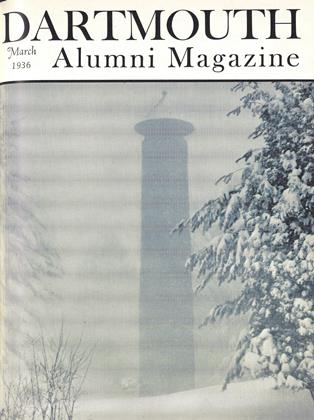Letters and Poems of Charles Kittredge Abbe (Dartmouth ex-1926), Edited by George Abbe. Association Press, 1936, pp. 196.
This is a Dartmouth book: not because the letters give a detailed portrayal of life in Hanover during those two-and-a-half years, but because in the heart of the author Dartmouth is the first and only love-the hills and the hill-wind, the ski jump and the hockey rink, the fellowship and that quite indescribable "Dartmouth Spirit." When Charles Abbe's almost fatal illness made it impossible for him to complete his junior year, he received his diploma later in Los Angeles; from sun-kist California he wrote, "Occidental could never be expected to command the love of a Dartmouth man " Hill-wind made him what he was.
But this is something more than a Dartmouth book. It is a book of manly struggle against insuperable odds, of profound loyalties, of deep insights into the best and the most beautiful that human life contains, of sheer courage, of delight in simple and abiding things, of character growing through difficulty. It is intimate for the letters are addressed to parents, sisters, brother, or sweetheart. It is a perfectly frank and genuine picture of youth living nobly during the hectic nineteen-thirties.
There is a revered father, an underpaid minister; a mother who shines unwittingly through her sacrifice and devotion; an older sister who goes through college and then shares the financial load, which is never light; and a "kid brother" (the editor of this volume) who idolizes Charles, not only the Big Brother but the pal and the wise counsellor. By sheer grit the boy goes through college "on a shoe string," but the fight is tough. Yet he steals enough time and energy to become a ski jumper, a master of the hockey puck, and a first-class tennis player. There are glowing passages on college life, sport, classrooms and professors, fraternities, trans-continental travel; sometimes there is confusion and discouragement, but more often there is eager optimism, profound faith and bravery. There is no Pollyanna stuff, little preachiness; to the very end, when he succumbs to an undiagnosed disease in his twenty-eighth year, he is a real MAN, "bloody but unbowed."
Nor is that all! Dartmouth men will understand and share such a deep love of Nature. There are superb paragraphs describing New England winter, thrilling climbs in the White Mountains and in the Sierra Madres, the still beauty of the desert, and his beloved Monadnock, under whose shadow he found home.
Family is the center of his life. These letters, quite natural and unforced, "filled with exuberance and tenderness" but never with sentimentality nor slush, portray a simple and devoted love, a rare self-efEacement, a gratitude that words can never quite express. Strangely enough, it is not home—for peripatetic ministers do not have "homes"; there is a pathetic yearning for one. It is Family, that one human relationship which can be (and, in his case, was) the noblest and happiest experience in life.
There are few disappointments. The literary quality of the letters is surprisingly high, for one so young; there is a good deal of fine writing, especially the prose. Any college would be glad to grasp to her bosom with bands of steel such a boy—true, honest, eager, purposeful, highly talented, "a spirited personality that never gave in."
 View Full Issue
View Full Issue
More From This Issue
-
 Article
ArticleCURRICULUM VIVENS
March 1936 By E. Gordon Bill -
 Article
ArticleHANOVER BROWSING
March 1936 By Herbert F. West '22 -
 Class Notes
Class NotesClass of 1911
March 1936 By Nathaniel G. Burleigh -
 Class Notes
Class NotesClass of 1910
March 1936 By Harold P. Hinman -
 Article
ArticleAbout Twenty-Five Years Ago
March 1936 By Warde Wilkins '13 -
 Class Notes
Class NotesClass of 1928
March 1936 By LeRoy C. Milliken









